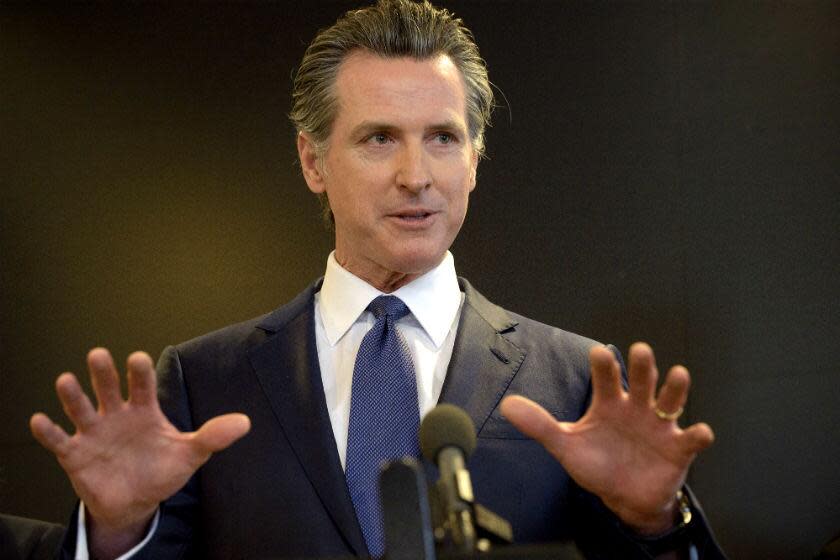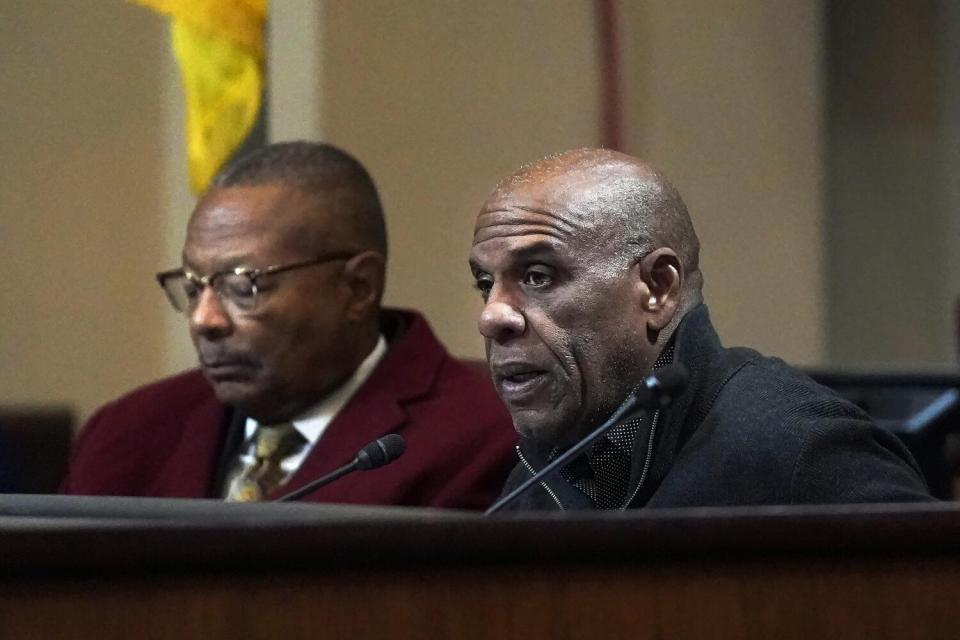New poll finds California voters resoundingly oppose cash reparations for slavery

- Oops!Something went wrong.Please try again later.
California voters oppose the idea of the state offering cash payments to the descendants of enslaved African Americans by a 2-to-1 margin, according to the results of a new poll that foreshadows the political difficulty ahead next year when state lawmakers begin to consider reparations for slavery.
The UC Berkeley Institute of Governmental Studies poll, co-sponsored by The Times, found that 59% of voters oppose cash payments compared with 28% who support the idea. The lack of support for cash reparations was resounding, with more than 4 in 10 voters “strongly” opposed.
"It has a steep uphill climb, at least from the public's point of view," said Mark DiCamillo, director of the IGS poll.
Democratic Gov. Gavin Newsom and state lawmakers created California's Reparations Task Force in 2020 with the goal of establishing a path to reparations that could serve as a model for the nation. After two years of deliberations, the task force sent a final report and recommendations this summer to the state Capitol, where Newsom and the Democratic-led Legislature will ultimately decide how the state should atone for slavery.

The group suggested providing cash payments to all descendants based on health disparities, mass incarceration and over-policing and housing discrimination that have adversely affected Black residents compared with white Californians.
The remedies recommended in the report also go far beyond cash payments and include policies to end the death penalty, pay fair market value for jail and prison labor, restore voting rights to all formerly and currently incarcerated people and apply rent caps to historically redlined ZIP Codes that disadvantaged Black residents, among dozens of other suggestions.
Read more: California's reparations proposal moves to Newsom, state lawmakers
The conclusion of the task force’s work places political pressure on Democrats to deliver on a process they started, but the unpopularity of cash payments suggests they'll face strong political head winds.
State Sen. Steven Bradford (D-Gardena), who served on the task force, said he wasn't surprised by the poll results.
"It speaks to the miseducation of most Americans when it comes to slavery and the impact that it had on this country and the impact that it still has on African Americans today," Bradford said.
The amount of cash reparations that could be paid to eligible descendants would vary greatly, but nevertheless has been the primary focus of critics.
For health disparities, the task force recommends $13,619 for each year of residency in California — a figure that was derived by comparing life expectancy between Black non-Hispanic and white non-Hispanic Californians. To compensate for mass incarceration and over-policing, the task force recommends eligible descendants receive $2,352 for each year of residency in California during the war on drugs from 1971 to 2020. Compensation for housing discrimination totaled $3,378 for each year between 1933 and 1977 that a descendant resided in California.
When asked about his stance on the proposal in the spring, Newsom said reparations are more than just cash payments. He reiterated that position in mid-June when interviewed by Fox News host Sean Hannity, and noted that coverage of recommendations by Fox News seized on cash payments and "ran with that over and over and over and over again."
"It doesn't have to be in the frame of writing a check; reparations comes in many different forms. But one cannot deny these historical facts, and I really believe very strongly we have to come to grips with what's happened," Newsom told Hannity.
Newsom has enjoyed broad support among Black voters and, given the overall opposition to cash reparations by most Californians, any action the governor takes on the issue could carry substantial political risk.
In the Berkeley poll, when voters who oppose reparations were asked why, the two main reasons cited most often were that “it’s unfair to ask today’s taxpayers to pay for wrongs committed in the past," picked by 60% of voters, and “it’s not fair to single out one group for reparations when other racial and religious groups have been wronged in the past," chosen by 53%.
Only 19% said their reason was that the proposal would cost the state too much, suggesting that money alone is not the main objection.
Among Democrats, 43% favored and 41% opposed cash reparations. Republicans were strongly against the proposal at 90% with only 5% in favor. Independents were 65% opposed and 22% in favor.

Black California voters were more likely to support cash payments than any other demographic, with 76% in favor and 16% opposed, the survey found. Almost two-thirds of white voters were opposed as were 6 in 10 Latino and Asian voters.
The success or failure of the reparations in California, where state government is controlled by Democrats and voters are relatively liberal compared with other states, is being watched as a potential bellwether for the movement across the country.
Read more: California's slavery reparations plan: Eligibility, payments and other details
DiCamillo said the poll results showed a dichotomy that could suggest Californians may be open to reparations in different forms.
Despite widespread opposition to cash payments, 60% of the overall respondents said they thought that the legacy of slavery is affecting the position of the state's Black residents today. Another 31% said there's no impact at all.
"The idea of cash reparations is really what's being strongly opposed," DiCamillo said. "There could be other solutions that could be much more warmly received."
Members of the reparations task force previously said convincing non-Black Californians that the harms from slavery are still persisting today could be one of the biggest challenges for proponents.
Much of the task force's work centered on hearing testimony from academics, economists and other experts to gather evidence of the effects of slavery and to prove the ways in which government-sanctioned policies discriminated against Black people long after slavery was abolished.
Assemblymember Reggie Jones-Sawyer (D-Los Angeles) called the response to the question about lasting harms "a positive sign." He also repeated the idea that the report offers many more recommendations beyond cash payments.
"I encourage all Californians to read the online report and learn about the history and conclusions made and view the historic and empirical data behind the final report," he said in a statement. "I believe attitudes will shift when the public is fully aware of what the report has to say."
Voters shared mixed opinions about whether the state is doing enough to ensure that its Black residents have a fair chance to succeed.
Statewide, 29% of voters said California is doing too little, while 26% said it is doing about the right amount; 22% said the state is doing too much. Nearly 1 in 4, or 23%, had no opinion.
The Berkeley Institute of Governmental Studies poll surveyed 6,030 registered California voters online in English and Spanish from Aug. 24-29.
Because the survey results are weighted to match census and voter registration benchmarks, estimates of the margin of error may be imprecise; however, the results are estimated to have a margin of error of 2 percentage points in either direction for the full sample.
Get the best of the Los Angeles Times’ politics coverage with the Essential Politics newsletter.
This story originally appeared in Los Angeles Times.

